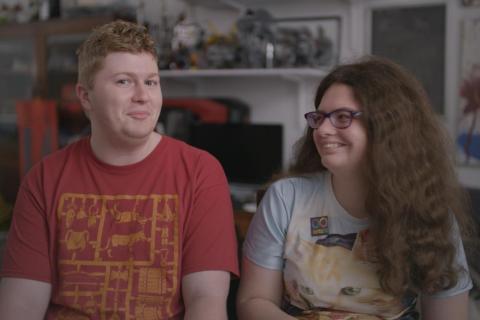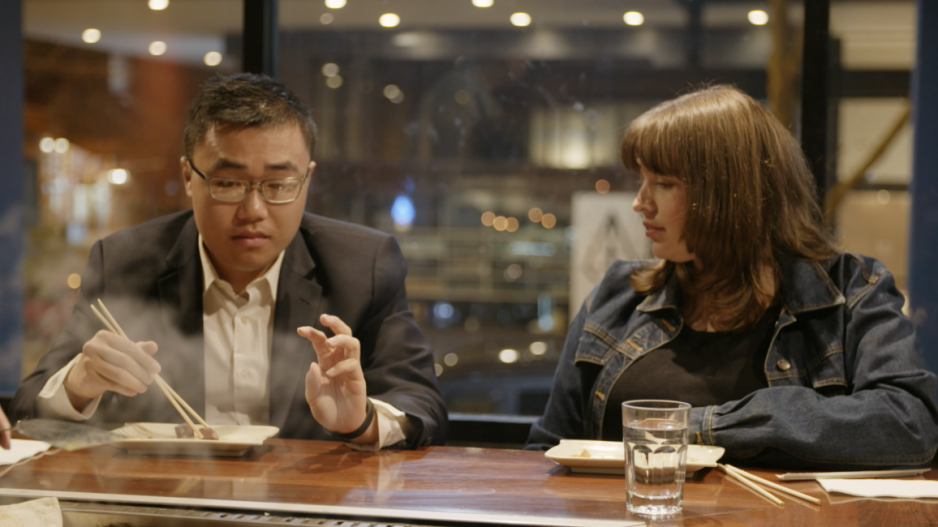
~ 4 minute read
As part of Autism Ontario’s broader initiative to examine how autistic people are portrayed in the media, we assembled a focus group of adults on the spectrum to review Love on the Spectrum. The group consisted of self-advocates Aaron Lenc, an employee of the City of Brampton; Matthew Lemay, professional writer; Courtney Weaver, freelance writer; and, David Moloney Autism Ontario Board Member. Michael Cnudde, self-advocate and Specialist Communications and Project Development, Autism Ontario, moderated the panel. Aaron’s mother, Tania White was also present.
When it was first announced back in July, Netflix’s Love on the Spectrum caused a big stir in the autistic community. The show follows a group of young adults on the spectrum as they navigate the world of relationships and dating. While these things are challenging for neurotypicals, they can be even more so for people on the spectrum. How would the show’s producers treat their subjects? Would they present a balanced and realistic view? Or would it be overly sentimental to the point of being saccharine?
“I was enthusiastic about it when I first heard about it,” says Courtney Weaver. “There are unfortunate stereotypes that autistic people are incapable of romantic love, or just don’t want romantic love. It was interesting to debunk this stereotype.”
Aaron Lenc looked forward to the show for another reason. “I really liked this show because I want a girlfriend, but I want to learn how to date. I learned from it and it was a good start.”
Other panelists commented on the presence of Jodi Rogers, a relationship expert who works with people on the on the spectrum on the show and provided guidance and support where it was needed.
“I personally really liked Jodi. I have worked with people like her in the past,” said Matthew Lemay. “I feel like the general population thinks that after a certain age people with autism don’t need help, and that’s not necessarily true. She was a wonderful addition to the show as she was able to bridge the gap between what people were needing.”
The idea of having someone acting as mentor is important, said David Moloney. “They need to proceed with the utmost of care, and really listen to the people they are profiling.”
"I thought it was easy to watch, refreshing, and the candidness of the participants on the show was so good,” said Courtney. “I laughed out loud when one of the established couples said, ‘When it comes to the two of us as a couple, I am fire, and he is water. When we are together it gets steamy.’
Aaron found the series very accessible. He watched all five episodes first by himself, and again with his family. “We paused and talked about what was happening,” said Aaron’s mother Tania White. “That was very helpful and a great resource for us as a whole family.”
Each panel member seemed to have their own favourite cast member. For Matthew it was Michael, whom he expressed a kinship for. “I had a few that I liked... I enjoyed Jimmy and Shenae. They were cute as a couple and their experience was lovely. It made me teary.”
“My favourite person in the show was Olivia Sharp,” said Courtney. “When she said, ‘Living on the spectrum was like living in a transparent box.’ Mentioning that barrier between people was an astute observation.”
Aaron found the show very relatable. "I liked Kelvin because his autism was like mine, he noted. “I hope there is a second season.”
All the participants agreed the series was worthy of another season and hoped its producers would expand its cast to make it more diverse to include Black, Indigenous and people of colour as well as more LBGTQIA2S+ representation.
A second season would be especially useful, said Aaron’s mother Tania because it might also explore understanding rejection and picking up social cues. “Even being able read the cues so it doesn’t cross the line when experiencing rejection is a necessary skill.”
An issue for many portrayals of autistics in the media was inclusion, fairness, and realism, which the panelists discussed. “I agree that people were portrayed fairly,” said Courtney. “With the genre of reality TV, there is a certain narrative and 1:1 interviews and editing take place within this genre. This was done as organically as you can do this.”
Matthew agreed with Courtney, adding, “There are certain editing and narrative decisions in a show that are unavoidable, but people were treated and portrayed as organically and fairly as possible.”
It is important for producers and writers to listen to people on the spectrum, said David when portraying people with autism. “Often people cast individuals who aren’t representing people on the spectrum as they should be...We should be represented as diverse, appreciated, hard-working, welcomed in society, and enhancing the social framework. Inclusion everywhere.”
Images provided courtesy of Netflix Canada
DISCLAIMER: This document reflects the views of the author. It is Autism Ontario’s intent to inform and educate. Every situation is unique and while we hope this information is useful, it should be used in the context of broader considerations for each person. Please contact Autism Ontario at info@autismontario.com or 416-246-9592 for permission to reproduce this material for any purpose other than personal use. © 2020 Autism Ontario 416.246.9592 www.autismontario.com


